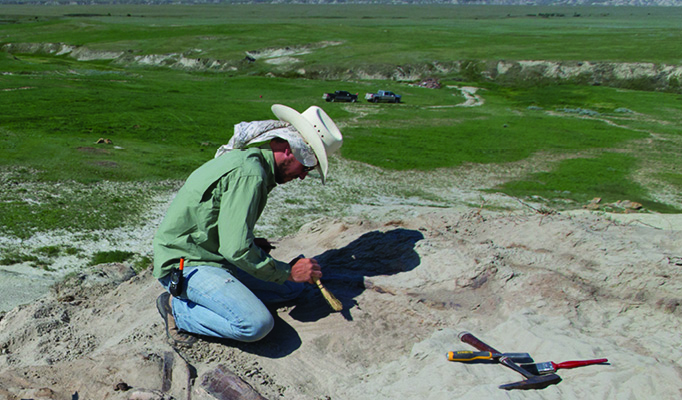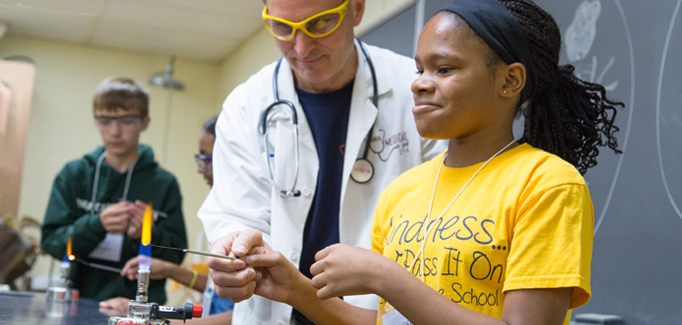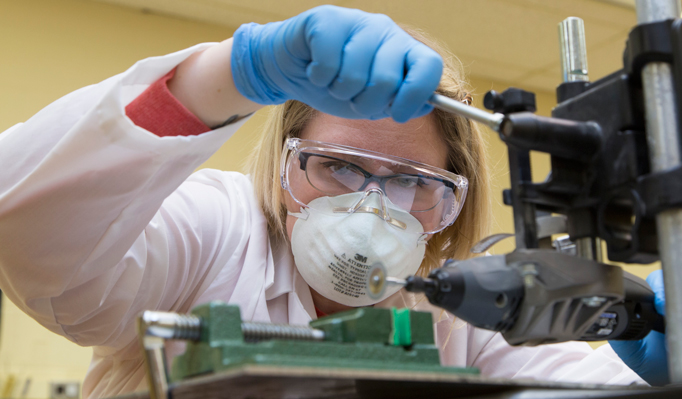Museum to Participate in March for Science
By Executive Director & CEO Dr. Evalyn Gates and Science Communications Officer John Mangels
The Cleveland Museum of Natural History is proud to take a stand for science and to play a leading role in March for Science Cleveland. We have officially endorsed the march, and our staff and volunteers who choose to participate will be marching under the banner of the Museum.
Why should anyone march in support of science? And why is it important to the Museum and our community to take a stand for science now?
Science always begins with a question — from the most basic, curiosity-driven kind (What is that? How does it work? What is it made of?) to the more practical (How can we make this better? Which treatment is more effective? How do we solve this problem?)
Science moves forward through a well-defined, systematic way of seeking answers to these questions. Scientists first study what is already known, then make observations and gather data, form a hypothesis, conduct rigorous, unbiased experiments to determine whether that hypothesis is valid, analyze the data and interpret the results, and finally present the findings so that other researchers can evaluate and build on the results.
 Museum paleontologist Lee Hall searches for dinosaur fossil material in Alberta, Canada.
Museum paleontologist Lee Hall searches for dinosaur fossil material in Alberta, Canada.
Scientific research at the Museum is conducted at field sites in Ohio and around the globe, and in the labs and collections areas of our Cleveland facility. Museum scientists and their students collect and analyze data that allow us to reconstruct the past and document the present. With this knowledge, we can develop a deeper understanding of the natural world and our place within it that enables us to work toward a healthier, more sustainable future for all of us and our descendants.
Our science is a small but vital part of a much larger endeavor, a thread in the rich tapestry of scientific research and exploration that has greatly increased our knowledge of ourselves and our Universe, and has led to technological advances woven into every aspect of our lives.
Without science, we wouldn’t know how our bodies work, and how to prevent, treat and, increasingly, cure diseases. We wouldn’t understand how and why the Moon rotates around the Earth, much less be able to send astronauts safely there and back. Our transportation system, our access to safe, clean water and sanitation, the computers and cellphones we depend on for work, communication and entertainment — none of these would exist without science.
While science informs and improves our existence, it also drives our economy. That’s especially apparent in Ohio, where science-based companies and institutions such as General Electric, Parker Hannifin, Lubrizol, NASA’s Glenn Research Center, Cleveland Clinic, University Hospitals and Case Western Reserve University employ hundreds of thousands of people and produce products and services that benefit everyone.
 Students getting a hands-on lesson in discovery at the Museum's Junior Medical Camp.
Students getting a hands-on lesson in discovery at the Museum's Junior Medical Camp.
Finally, science enriches our lives. It inspires us to dream and equips us to achieve. Science is the catalyst for — and the consequence of — curiosity. Its marching orders are how and why. Every day at the Museum, we see guests of all ages and backgrounds literally transformed by the science they encounter here. From a trip to distant galaxies via the planetarium to an encounter with Ohio’s native wildlife, visitors immerse themselves in the adventure of science and joy of discovery. Most importantly, they leave wanting to know more. For many, we hope, that becomes a lifelong quest, fueled and fostered by science.
Now let’s tackle those first questions, about why we should march for science.
The answer is that now more than ever we are living in a world in which scientific data and the pursuit of scientific knowledge are questioned, ignored or even suppressed because of competing agendas. This is unfortunate, because at its core science isn’t about politics or political parties.
Science looks for answers. What societies and governments do with these answers is where politics comes in, deciding which policies and solutions are best for our country or region – and that’s entirely appropriate. However, those decisions are best made after thoughtful discussion and debate, based on the scientific evidence, by an informed public and political leadership.
Politics also plays a role in how much money the government spends on scientific research, and again, that’s fair — taxpayers who provide the funding and legislators who apportion it on the public’s behalf absolutely deserve a say in how and where the money is used.
But making sound political decisions about what scientific research to undertake, how much to spend and how to respond to its findings, requires some common ground.
 Curator of Human Health & Evolutionary Medicine Dr. Nicole Burt analyzes teeth to map a healthier future for infants in Cleveland.
Curator of Human Health & Evolutionary Medicine Dr. Nicole Burt analyzes teeth to map a healthier future for infants in Cleveland.
We have to collectively agree that science itself is vital — with tangible benefits that make it a worthwhile endeavor for society to support. And we have to accept that science’s mission isn’t to generate lies or skewed data. It strives for the truth; in fact, the scientific method is designed to relentlessly root out and correct inaccuracies.
Currently, funding for all sorts of science research faces dramatic cuts, and findings that have widespread scientific accord but that contradict a political agenda are branded as hoaxes. If we can’t agree on the worthiness and legitimacy of science, it’s hard to imagine how we’ll continue to make progress as a nation and continue as the global leader in scientific research and discovery.
Scientific findings can be unsettling. They may challenge our beliefs, or provoke uncomfortable debates or decisions. But science can also be wondrous and uplifting, helping us appreciate the beauty and complexity of life.
Science should be celebrated. Science must be supported. That’s why we march.
March for Science Cleveland is a public event that will be held in Downtown Cleveland on Saturday, April 22, 2017 beginning at 9am. Organized by volunteers and a coalition of local foundations and science-based organizations, March for Science Cleveland aims to underscore the vital importance of science in our everyday lives and celebrate the impact of science in Northeast Ohio. Find out more about March for Science Cleveland here.
Go back to all announcements